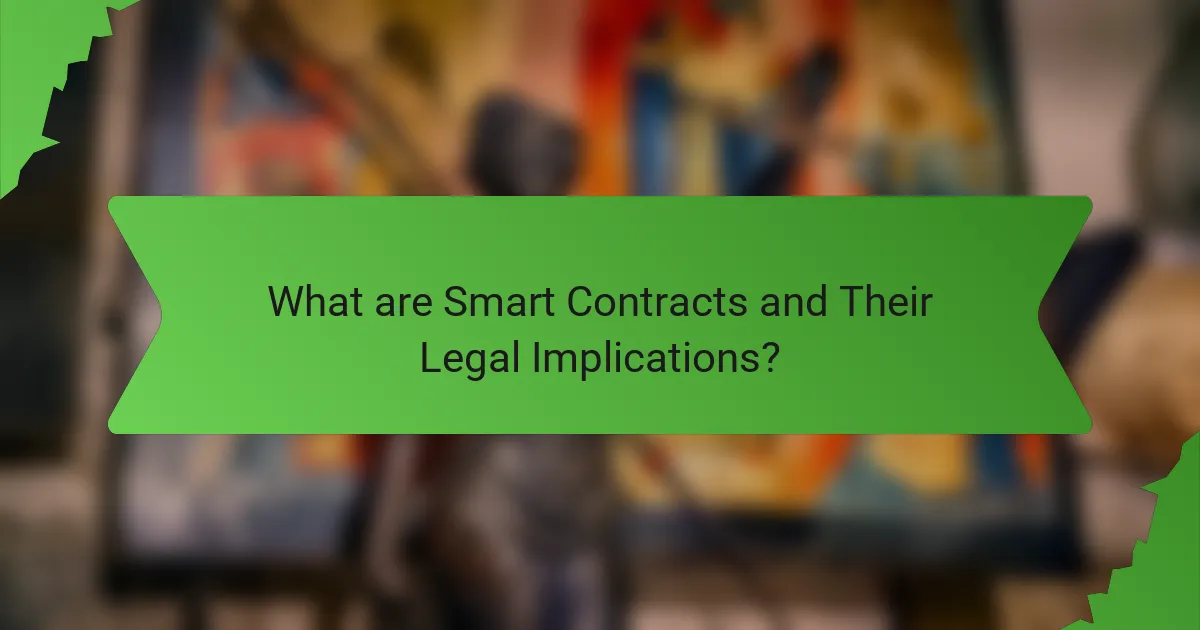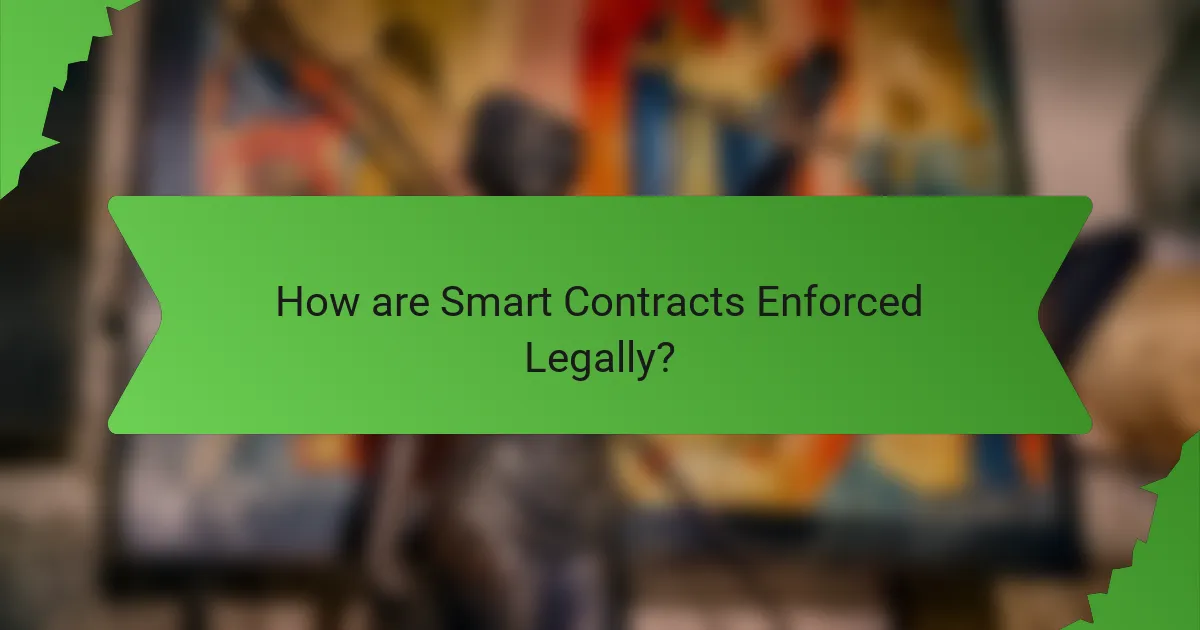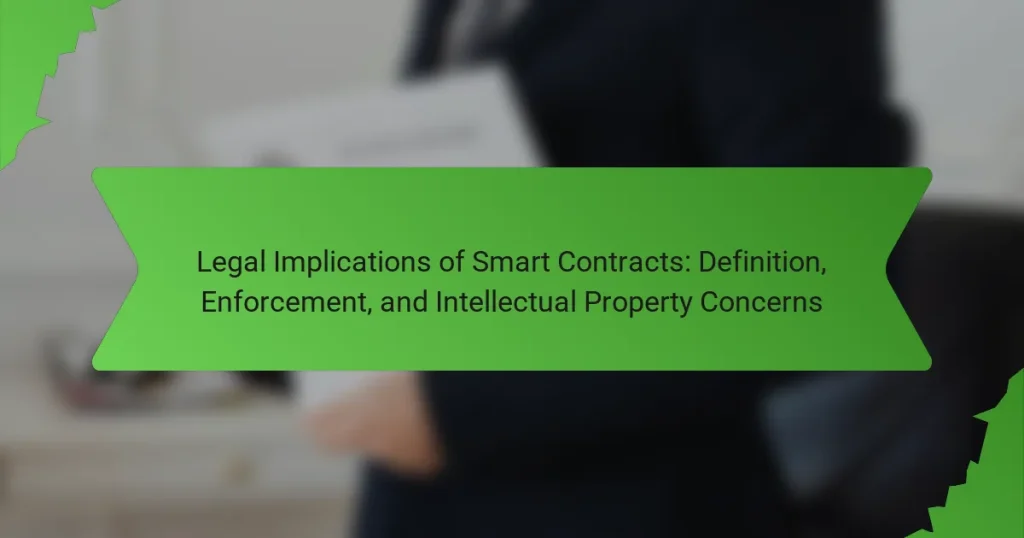Smart contracts are self-executing agreements with terms encoded in software, operating on blockchain technology to ensure automatic execution upon meeting specified conditions. This article examines the legal implications of smart contracts, including their enforceability under traditional contract law and the varying recognition across jurisdictions. It also addresses intellectual property concerns, such as copyright, patent, and trademark issues that may arise from their use. The discussion highlights the need for clear legal frameworks to manage the complexities associated with smart contracts and intellectual property rights, ensuring their effective implementation and resolution of potential disputes.

What are Smart Contracts and Their Legal Implications?
Smart contracts are self-executing contracts with the terms of the agreement directly written into code. They run on blockchain technology, enabling automatic execution when predefined conditions are met. This technology enhances efficiency and reduces the need for intermediaries. Legal implications include enforceability, as jurisdictions vary in recognizing digital contracts. Courts may view smart contracts as valid if they meet traditional contract elements. The lack of regulatory clarity can lead to disputes over interpretation and enforcement. Additionally, issues related to intellectual property rights may arise, particularly concerning code ownership and copyright.
How do Smart Contracts function in a legal context?
Smart contracts function as self-executing contracts with the terms directly written into code. They automate the execution of agreements when predetermined conditions are met. In a legal context, they can enhance efficiency and reduce the need for intermediaries. Smart contracts are recorded on a blockchain, providing transparency and immutability. This technology ensures that once deployed, the contract cannot be altered without consensus. Legal recognition of smart contracts varies by jurisdiction. Some regions have enacted laws to validate their use. For instance, the U.S. Uniform Electronic Transactions Act recognizes electronic signatures and records, which can encompass smart contracts.
What are the essential elements of a Smart Contract?
A smart contract consists of several essential elements. These elements include code, execution conditions, and an agreement between parties. The code defines the terms and conditions of the contract. Execution conditions specify when the contract will be triggered. The agreement outlines the obligations and rights of each party involved. Smart contracts are stored on a blockchain, ensuring transparency and security. They are immutable, meaning once deployed, the terms cannot be altered. This immutability enhances trust among parties. Additionally, smart contracts often include automated enforcement mechanisms. These mechanisms execute actions when predetermined conditions are met, reducing the need for intermediaries.
How do Smart Contracts differ from traditional contracts?
Smart contracts differ from traditional contracts primarily in their execution and enforcement mechanisms. Smart contracts are self-executing agreements with the terms directly written into code. This allows for automatic execution when predetermined conditions are met. Traditional contracts, on the other hand, require manual enforcement and interpretation by parties or courts.
Smart contracts operate on blockchain technology, ensuring transparency and security. Traditional contracts often rely on physical documentation and third-party verification. Additionally, smart contracts reduce the risk of fraud due to their immutable nature. Traditional contracts can be altered or disputed, leading to potential legal challenges.
The efficiency of smart contracts can lead to faster transaction times. Traditional contracts may involve lengthy negotiation and review processes. As a result, smart contracts can lower transaction costs by eliminating intermediaries. Traditional contracts often incur legal fees and administrative costs.
These differences highlight the evolving landscape of contract law as technology advances.
Why are Legal Implications important for Smart Contracts?
Legal implications are important for smart contracts because they define the enforceability and legality of the agreements made. Smart contracts operate on blockchain technology, which lacks traditional legal frameworks. Without legal recognition, parties may face challenges in enforcing contract terms. Legal implications ensure that smart contracts comply with existing laws and regulations. They provide clarity on liability, rights, and obligations of all parties involved. For example, jurisdictions like the U.S. have begun to recognize smart contracts under the Uniform Electronic Transactions Act. This recognition helps mitigate risks associated with disputes and non-compliance.
What potential legal challenges do Smart Contracts face?
Smart contracts face several potential legal challenges. One challenge is the issue of enforceability. Jurisdictions vary in their recognition of smart contracts as legally binding agreements. Another challenge is the lack of regulatory clarity. Many legal frameworks do not explicitly address smart contracts, leading to uncertainty. Additionally, issues of jurisdiction arise when parties are in different locations. This complicates legal proceedings and enforcement. There are also concerns about compliance with existing laws. Smart contracts may inadvertently violate regulations, such as consumer protection laws. Furthermore, the potential for coding errors poses risks. Flaws in the code can lead to unintended consequences. Lastly, disputes over contract interpretation can arise. Traditional legal principles may not apply seamlessly to automated agreements.
How do jurisdictions influence the legality of Smart Contracts?
Jurisdictions influence the legality of smart contracts through their specific legal frameworks and regulations. Different jurisdictions may recognize smart contracts in varying ways. Some jurisdictions may classify them as legally binding agreements, while others may not. The enforceability of smart contracts often depends on local contract laws. Jurisdictions with established blockchain regulations tend to provide clearer legal recognition. Conversely, areas lacking such regulations may create uncertainty for smart contract enforcement. Furthermore, compliance with local laws, such as consumer protection and data privacy, can impact the validity of smart contracts. Legal precedents and interpretations also shape how smart contracts are treated in different regions.

How are Smart Contracts Enforced Legally?
Smart contracts are enforced legally through traditional contract law principles. They require mutual consent, consideration, and lawful purpose to be binding. Jurisdictions may recognize smart contracts as valid agreements if they meet these criteria. Courts can enforce smart contracts by interpreting their terms as they would with traditional contracts. Legal frameworks such as the Uniform Electronic Transactions Act (UETA) and the Electronic Signatures in Global and National Commerce Act (ESIGN) support this enforcement. Additionally, blockchain technology provides an immutable record of transactions, enhancing their legal standing. Some jurisdictions have specific regulations addressing smart contracts, further solidifying their enforceability.
What mechanisms exist for enforcing Smart Contracts?
Smart contracts are enforced through blockchain technology, legal frameworks, and oracles. Blockchain technology ensures that smart contracts execute automatically when predefined conditions are met. This immutability prevents tampering and enhances trust among parties. Legal frameworks support enforcement by recognizing smart contracts as valid agreements under specific jurisdictions. Courts can enforce these contracts if they meet legal requirements. Oracles serve as intermediaries, providing real-world data to smart contracts. They ensure that external conditions are accurately reflected in the contract execution. Together, these mechanisms create a robust system for enforcing smart contracts.
How does blockchain technology support enforcement?
Blockchain technology supports enforcement by providing a secure and immutable ledger for transactions. This ensures that all parties have access to a verifiable record of agreements. Smart contracts, which are self-executing contracts with the terms directly written into code, operate on blockchain networks. They automatically enforce compliance by executing actions when predefined conditions are met. This reduces reliance on intermediaries, thereby streamlining enforcement processes. The transparency of blockchain allows for real-time monitoring of contract performance. Additionally, tamper-proof records enhance trust among parties involved. Studies show that blockchain reduces disputes by providing clear evidence of contractual terms and execution.
What role do courts play in Smart Contract enforcement?
Courts play a critical role in the enforcement of smart contracts. They interpret the legal validity of these contracts under existing laws. When disputes arise, courts can provide a forum for resolution. Courts assess whether the terms of a smart contract comply with traditional contract law principles. They can enforce the contract if it meets legal requirements such as offer, acceptance, and consideration. Additionally, courts can provide remedies for breach, including damages or specific performance. Legal precedents influence how courts view smart contracts. For instance, the Uniform Electronic Transactions Act (UETA) recognizes electronic contracts as enforceable. Thus, courts serve as a bridge between technology and traditional legal frameworks.
What are the limitations of enforcing Smart Contracts?
Smart contracts have several limitations in enforcement. They rely on the accuracy of the underlying code. Any bugs or errors can lead to unintended outcomes. Additionally, smart contracts may struggle with real-world data integration. They often depend on oracles for external information, which can be unreliable. Jurisdictional issues also complicate enforcement. Different legal systems may not recognize or enforce smart contracts uniformly. Furthermore, the lack of regulatory clarity can hinder their adoption. Courts may find it challenging to interpret the terms of a smart contract. Lastly, human factors such as misunderstanding the contract terms can lead to disputes. These limitations highlight the complexities involved in enforcing smart contracts effectively.
What challenges arise in dispute resolution?
Challenges in dispute resolution include ambiguity in contract terms and differing interpretations. Smart contracts often lack clear language, leading to confusion. This ambiguity can result in disagreements between parties. Additionally, jurisdictional issues may arise due to varying laws across regions. Enforcing smart contracts in different legal systems complicates resolution efforts. Technical complexities also pose challenges, as parties may struggle with the technology involved. Lastly, the lack of established precedents for smart contracts can hinder effective dispute resolution. These factors collectively create significant obstacles in resolving disputes effectively.
How do Smart Contracts handle breaches of agreement?
Smart contracts handle breaches of agreement through automated enforcement mechanisms. When a breach occurs, the contract’s code executes predefined actions. These actions can include penalties, refunds, or termination of the contract. The enforcement is based on the conditions coded within the smart contract. For example, if a payment is not made by a specified date, the contract may automatically impose a fine. This automation reduces the need for legal intervention. Additionally, the immutable nature of blockchain records ensures transparency in transactions. This transparency helps in proving a breach occurred. Thus, smart contracts provide a reliable method for managing breaches efficiently.

What Intellectual Property Concerns are Associated with Smart Contracts?
Intellectual property concerns associated with smart contracts include copyright, patent, and trademark issues. Smart contracts can automate the execution of agreements involving copyrighted materials. This raises questions about ownership and rights to the underlying content. Additionally, if a smart contract includes patented technology, it may infringe on existing patents. This can lead to legal disputes over patent rights. Trademark concerns arise if smart contracts are used to facilitate transactions involving branded goods. Misuse of trademarks within smart contracts can result in liability for trademark infringement. Furthermore, the immutability of smart contracts can complicate the resolution of intellectual property disputes. Once deployed, correcting errors related to intellectual property can be challenging and costly. These concerns highlight the need for clear legal frameworks governing smart contracts and intellectual property rights.
How do Smart Contracts impact Intellectual Property rights?
Smart contracts significantly impact intellectual property (IP) rights by automating the enforcement of agreements. They provide a decentralized and transparent framework for managing IP assets. This technology allows creators to set specific terms for usage and distribution. For example, smart contracts can automatically execute licensing agreements when conditions are met. This reduces the risk of infringement by ensuring compliance with terms. Additionally, immutable records on the blockchain enhance proof of ownership. Research indicates that smart contracts can streamline IP transactions, making them more efficient and secure. Overall, they transform traditional IP management practices by increasing transparency and reducing disputes.
What types of Intellectual Property can be involved in Smart Contracts?
Smart contracts can involve various types of intellectual property. These include copyrights, trademarks, patents, and trade secrets. Copyrights protect original works of authorship, such as software code within smart contracts. Trademarks safeguard brand names and logos used in conjunction with smart contracts. Patents can cover innovative processes or technology utilized by smart contracts. Trade secrets protect confidential business information that may be integral to the functioning of smart contracts. Each type of intellectual property plays a crucial role in defining rights and obligations within the framework of smart contracts.
How can Smart Contracts protect Intellectual Property?
Smart contracts can protect intellectual property by automating the enforcement of rights and agreements. They use blockchain technology to create secure, tamper-proof records of ownership. This ensures that the original creator’s rights are maintained. Smart contracts can specify terms for usage, licensing, and royalties. They execute automatically when conditions are met, reducing the risk of infringement. Additionally, they provide transparent tracking of ownership transfers. This transparency helps prevent disputes over intellectual property rights. Research indicates that blockchain can enhance the protection of digital assets significantly.
What are the risks of Intellectual Property infringement in Smart Contracts?
Intellectual Property infringement in Smart Contracts poses several risks. These include unauthorized use of copyrighted material, which can lead to legal disputes. Smart Contracts may inadvertently incorporate protected content without proper licensing. This can result in financial penalties and reputational damage for the parties involved. Additionally, the immutable nature of Smart Contracts complicates remediation efforts after infringement is discovered. Legal frameworks governing IP rights may not adequately address the unique aspects of Smart Contracts. This creates uncertainty in enforcement and compliance. Overall, the risks are significant and require careful consideration when drafting Smart Contracts.
How can parties mitigate the risk of infringement?
Parties can mitigate the risk of infringement by conducting thorough due diligence on intellectual property rights. This includes researching existing patents, trademarks, and copyrights relevant to their projects. Parties should also implement clear licensing agreements that define usage rights and limitations. Regular audits of their own intellectual property can help identify potential infringements early. Additionally, they can seek legal counsel to ensure compliance with applicable laws. Training employees on intellectual property issues is essential for awareness and prevention. Utilizing technology to monitor and protect intellectual property can further reduce risks. These strategies collectively create a robust framework for minimizing infringement risks.
What legal precedents exist regarding Smart Contracts and Intellectual Property?
Legal precedents regarding smart contracts and intellectual property are still developing. One significant case is the 2018 decision in the U.S. District Court for the Southern District of New York, where the court ruled on the enforceability of smart contracts under the Uniform Commercial Code. This ruling acknowledged that smart contracts can be legally binding if they meet the criteria of offer, acceptance, and consideration.
Another relevant case is the 2020 ruling in the case of “Wright v. McCormack,” where the court examined the ownership of digital assets and the applicability of intellectual property laws to blockchain technology. This case highlighted the intersection of intellectual property rights and digital contract enforcement.
Additionally, the European Union’s 2020 proposal for a Digital Services Act indicates a growing recognition of the need for legal frameworks addressing smart contracts and intellectual property. This proposal aims to clarify the legal status of smart contracts in relation to existing IP laws.
These cases and proposals illustrate the evolving landscape of legal precedents concerning smart contracts and intellectual property, emphasizing the need for continued legal clarity and adaptation.
What best practices should be followed when dealing with Smart Contracts?
Follow these best practices when dealing with smart contracts: conduct thorough audits to ensure code accuracy. Testing for vulnerabilities is crucial to prevent exploits. Use established programming languages and frameworks to enhance reliability. Implement clear documentation for transparency and future reference. Ensure compliance with legal standards to avoid disputes. Regularly update contracts to adapt to changing regulations. Engage legal experts to review terms and conditions. Monitor contract performance and address issues promptly. These practices enhance security and legal enforceability.
Smart contracts are self-executing agreements with terms encoded directly into blockchain technology, facilitating automatic execution when conditions are met. This article explores the legal implications of smart contracts, including their enforceability across different jurisdictions, essential elements, and how they differ from traditional contracts. It addresses the challenges of legal recognition, compliance, and potential disputes, as well as the impact of smart contracts on intellectual property rights. Key topics include enforcement mechanisms, limitations, and best practices for mitigating risks associated with intellectual property infringement in the context of smart contracts.




